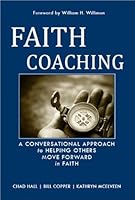# Faith Coaching

## Metadata
- Author: [[Chad Hall, Bill Copper, and Kathryn McElveen]]
- Full Title: Faith Coaching
- Category: #books
## Highlights
- coaching is a relationship that gets you from where you are to where you want to be. ([Location 364](https://readwise.io/to_kindle?action=open&asin=B002QB0PQ0&location=364))
- Coaching focuses on bringing to light what the person being coached already knows (but may not know they know!) and then helping the person to make decisions and take action so they can move forward to some goal they have or a dream they want to achieve. ([Location 367](https://readwise.io/to_kindle?action=open&asin=B002QB0PQ0&location=367))
- a person moves from where they are (X) to where they want to be (Y) by doing something different (Z). ([Location 373](https://readwise.io/to_kindle?action=open&asin=B002QB0PQ0&location=373))
- These days, a culture of customization and personalization is making a comeback. ([Location 549](https://readwise.io/to_kindle?action=open&asin=B002QB0PQ0&location=549))
- Assembly lines work great for building automobiles and cell phones, but not so much for developing people. People are way too complex and valuable for one-size approaches. ([Location 578](https://readwise.io/to_kindle?action=open&asin=B002QB0PQ0&location=578))
- what makes our culture ripe for coaching is not just our love for customization, but also that we prefer the solutions we have a hand in developing. ([Location 581](https://readwise.io/to_kindle?action=open&asin=B002QB0PQ0&location=581))
- Ours is a do-it-yourself world. We appreciate rolling up our sleeves and getting involved in the work. This trend is most obvious in the way we interact with our homes: we build our own patios, paint our own walls and lay our own tile. ([Location 582](https://readwise.io/to_kindle?action=open&asin=B002QB0PQ0&location=582))
- When people come up with their own solutions for their own unique circumstances, they are much more likely to implement those solutions because there is true ownership. It is also more likely that those solutions will work, since they account for the uniqueness of the situation and the people involved. ([Location 655](https://readwise.io/to_kindle?action=open&asin=B002QB0PQ0&location=655))
- The over-emphasis on conversion narrowed the scope of our shared faith formation experience so that multiple generations passed without having much experience of spiritual development outside the attention to immediate conversion. ([Location 681](https://readwise.io/to_kindle?action=open&asin=B002QB0PQ0&location=681))
- Each disciple’s journey looks somewhat different from any other’s. Particular opportunities are presented to one person while different ones are presented to another person. Because coaching is relationship-oriented and flexible to the unique story of the person being coached, it helps the faith journey unfold in the unique best way for each “uniquely and wonderfully made” person. ([Location 714](https://readwise.io/to_kindle?action=open&asin=B002QB0PQ0&location=714))
- coaching results in learning that is transformational, not just informational. ([Location 727](https://readwise.io/to_kindle?action=open&asin=B002QB0PQ0&location=727))
- coaching leads to both cognitive change and behavioral change. ([Location 738](https://readwise.io/to_kindle?action=open&asin=B002QB0PQ0&location=738))
- Coaching helps bridge the cognitive/behavioral divide by linking our values, thoughts and actions so that our thoughts and actions align and flow from the same source. ([Location 744](https://readwise.io/to_kindle?action=open&asin=B002QB0PQ0&location=744))
- people don’t do what you tell them to do—even if you are right (which I rarely was). People do what they tell themselves to do. ([Location 855](https://readwise.io/to_kindle?action=open&asin=B002QB0PQ0&location=855))
- Our best role is not to convict, but to engage a person in dialogue and to get truly curious about what God might be revealing to the person so that God can convict and convince. ([Location 871](https://readwise.io/to_kindle?action=open&asin=B002QB0PQ0&location=871))
- God is not into mass production or assembly line manufacturing of souls. God is the business of nurturing human beings into heaven dwellers, and while true conversion always leads to and through Christ, the process looks different for each person. ([Location 874](https://readwise.io/to_kindle?action=open&asin=B002QB0PQ0&location=874))
- When we talk about having a coaching mindset, we are really talking about four things: our beliefs, our behaviors, our relationships, and our results, which integrate to form a single system. Change in one category requires/results in a change in the rest, and the system self-reinforces. ([Location 886](https://readwise.io/to_kindle?action=open&asin=B002QB0PQ0&location=886))
- “What” questions are really useful in coaching because they promote discussion and discovery. “What” questions are open ended; they require more than a yes or no. ([Location 1113](https://readwise.io/to_kindle?action=open&asin=B002QB0PQ0&location=1113))
- good questions begin with words like “how,” “when,” “where” or “who.” These questions cause the other person to think through his ideas, actions, and strategies for moving forward. They don’t judge and they look forward rather than to the past. ([Location 1115](https://readwise.io/to_kindle?action=open&asin=B002QB0PQ0&location=1115))
- In order to coach another person, it is incumbent on a coach from the outset to believe that the other person is naturally creative and resourceful and has within her the ability to plan solutions and take action. ([Location 1203](https://readwise.io/to_kindle?action=open&asin=B002QB0PQ0&location=1203))
- three-phase process: • Narrow to Focus • Explore Options • Design Actions ([Location 1238](https://readwise.io/to_kindle?action=open&asin=B002QB0PQ0&location=1238))
- the coach’s goal is to get the other person to think of things she hasn’t already considered, to connect the dots in new ways and to learn something new. ([Location 1359](https://readwise.io/to_kindle?action=open&asin=B002QB0PQ0&location=1359))
- Remember your commitment to the very best interests of the PBC and be willing to not coach people when you can’t be at your best. ([Location 1809](https://readwise.io/to_kindle?action=open&asin=B002QB0PQ0&location=1809))
- Ask permission. In the conversation between Leslie and her coach, the coach offers a suggestion in response to the PBC’s feeling “stuck,” and gets permission to share. Few PBCs will deny you the opportunity, and asking permission allows them to invite your reflections. ([Location 2030](https://readwise.io/to_kindle?action=open&asin=B002QB0PQ0&location=2030))
- The story of life flows through four major acts. We will join others in naming these acts: creation, fall, redemption, and restoration. ([Location 2789](https://readwise.io/to_kindle?action=open&asin=B002QB0PQ0&location=2789))
- “Don’t waste time trying to put in what was left out. Try to draw out what was left in. That is hard enough.” (First, Break All the Rules, p. 57) ([Location 2843](https://readwise.io/to_kindle?action=open&asin=B002QB0PQ0&location=2843))
- Coaching carries an incarnate quality because it encourages people to turn thoughts into actions. Thinking good things is not enough. We are called to act on those good intentions. We are to reflect on that which is true (Philippians 4:8) and to act in new ways based on our reflective encounter with truth. ([Location 2903](https://readwise.io/to_kindle?action=open&asin=B002QB0PQ0&location=2903))